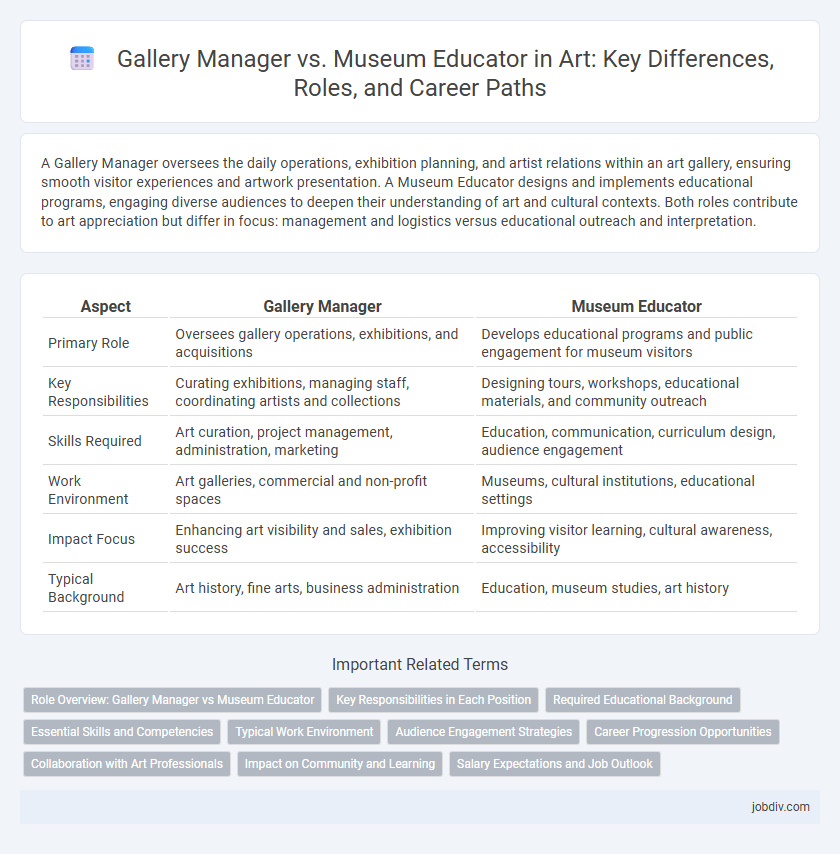A Gallery Manager oversees the daily operations, exhibition planning, and artist relations within an art gallery, ensuring smooth visitor experiences and artwork presentation. A Museum Educator designs and implements educational programs, engaging diverse audiences to deepen their understanding of art and cultural contexts. Both roles contribute to art appreciation but differ in focus: management and logistics versus educational outreach and interpretation.
Table of Comparison
| Aspect | Gallery Manager | Museum Educator |
|---|---|---|
| Primary Role | Oversees gallery operations, exhibitions, and acquisitions | Develops educational programs and public engagement for museum visitors |
| Key Responsibilities | Curating exhibitions, managing staff, coordinating artists and collections | Designing tours, workshops, educational materials, and community outreach |
| Skills Required | Art curation, project management, administration, marketing | Education, communication, curriculum design, audience engagement |
| Work Environment | Art galleries, commercial and non-profit spaces | Museums, cultural institutions, educational settings |
| Impact Focus | Enhancing art visibility and sales, exhibition success | Improving visitor learning, cultural awareness, accessibility |
| Typical Background | Art history, fine arts, business administration | Education, museum studies, art history |
Role Overview: Gallery Manager vs Museum Educator
Gallery Managers oversee the daily operations of art galleries, including exhibition planning, artist relations, and sales management to ensure a seamless visitor experience. Museum Educators develop and implement educational programs and interpretive materials that engage diverse audiences and enhance understanding of art collections. Both roles require strong communication skills, but Gallery Managers focus on commercial and operational aspects while Museum Educators prioritize educational outreach and audience engagement.
Key Responsibilities in Each Position
Gallery Managers oversee exhibition planning, artist relations, and sales management to ensure optimal visitor engagement and revenue generation. Museum Educators design and implement educational programs, facilitate tours, and develop learning materials to enhance public understanding of art collections. Both roles require collaboration with curators, but Gallery Managers emphasize commercial success while Museum Educators prioritize educational outreach.
Required Educational Background
Gallery managers typically require a bachelor's degree in art management, business administration, or fine arts to develop skills in exhibition planning and client relations. Museum educators often hold advanced degrees such as a master's in museum studies, education, or art history, emphasizing teaching methodologies and audience engagement. Both roles benefit from specialized training, but museum educators prioritize academic credentials focused on education theory and curriculum development.
Essential Skills and Competencies
Gallery Managers excel in organizational skills, inventory management, and client relations, ensuring smooth exhibition operations and sales. Museum Educators specialize in communication, curriculum development, and audience engagement to create meaningful educational programs. Both roles require strong knowledge of art history, but Gallery Managers prioritize business acumen, while Museum Educators emphasize public interaction and teaching expertise.
Typical Work Environment
Gallery managers typically work in commercial art galleries where they oversee exhibitions, coordinate with artists, and manage sales, often in bustling urban settings. Museum educators operate within museums or cultural institutions, engaging diverse audiences through educational programs and guided tours in formal, structured environments. Both roles require collaboration with art professionals but differ significantly in workplace dynamics and focus on sales versus education.
Audience Engagement Strategies
Gallery Managers employ targeted marketing campaigns and event programming to enhance visitor interaction and increase foot traffic, leveraging social media analytics to tailor experiences. Museum Educators design immersive, curriculum-aligned workshops and interactive tours to deepen audience understanding and foster long-term educational impact. Both roles utilize audience feedback and demographic data to refine engagement strategies and maximize cultural relevance.
Career Progression Opportunities
Gallery Managers often advance by developing expertise in curatorial practices, exhibitions, and client relations, leading to roles such as Director of Galleries or Curatorial Director. Museum Educators typically progress through expanding their knowledge in educational programming and public engagement, potentially moving into positions like Education Coordinator or Director of Museum Education. Both careers offer paths to leadership roles, with Gallery Managers focusing on art sales and collections, while Museum Educators emphasize community outreach and educational impact.
Collaboration with Art Professionals
Gallery Managers coordinate closely with curators, artists, and marketing teams to ensure seamless exhibition planning and promotion, fostering a dynamic environment for contemporary art presentations. Museum Educators collaborate with curators, conservators, and educators to develop educational programs that enhance visitor engagement and deepen understanding of art collections. Both roles demand strong communication and teamwork skills to bridge the gap between artistic vision and audience experience effectively.
Impact on Community and Learning
Gallery Managers curate dynamic exhibitions that engage diverse audiences, fostering community involvement through interactive art experiences and local artist collaborations. Museum Educators design educational programs that deepen visitors' understanding of art history and cultural contexts, promoting lifelong learning and critical thinking skills. Both roles significantly impact community engagement by making art accessible and meaningful, but Gallery Managers emphasize public outreach, while Museum Educators focus on structured educational enrichment.
Salary Expectations and Job Outlook
Gallery managers typically command salaries ranging from $45,000 to $70,000 annually, reflecting responsibilities in art sales, event coordination, and client relations. Museum educators earn between $40,000 and $60,000 per year, focused on developing educational programs and engaging diverse audiences. Both roles show steady job growth, with demand driven by expanding public interest in arts and cultural experiences.
Gallery Manager vs Museum Educator Infographic

 jobdiv.com
jobdiv.com